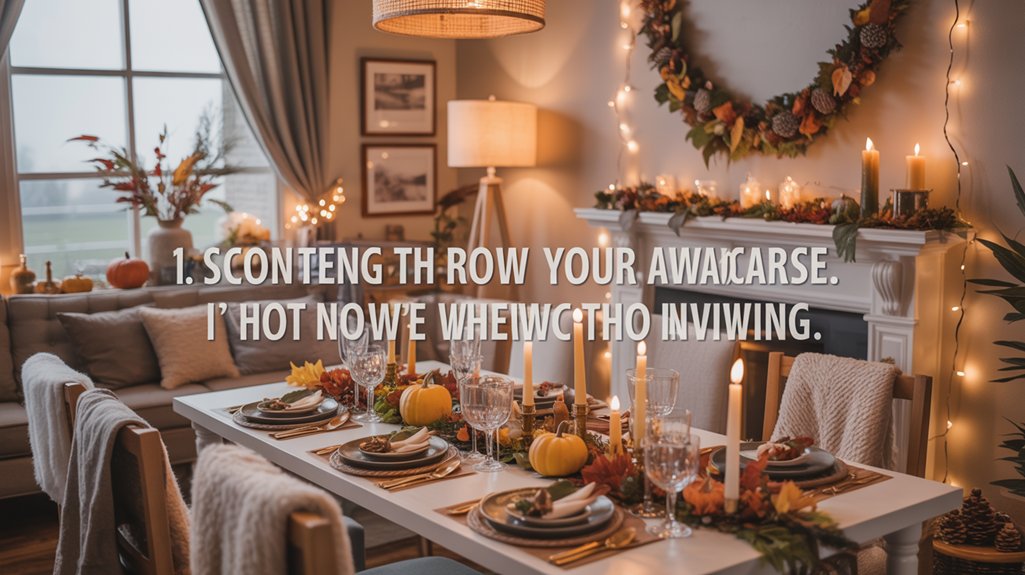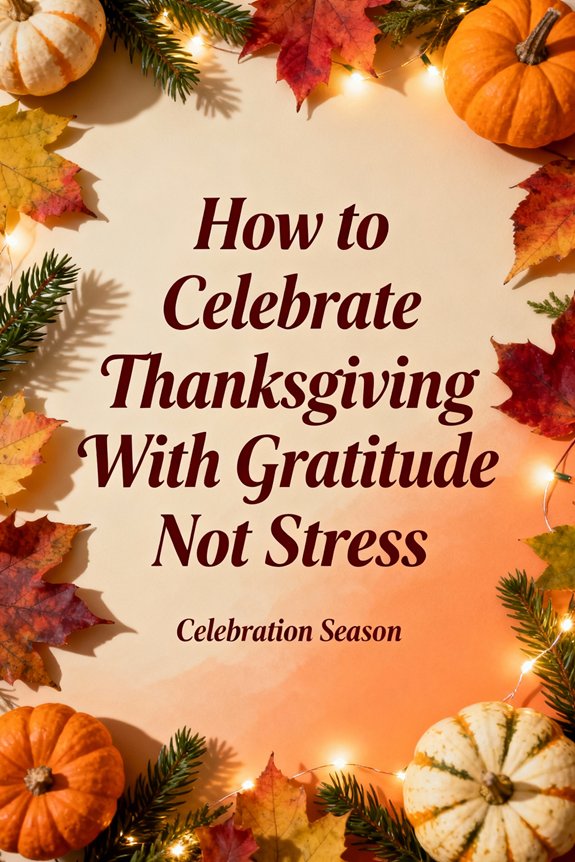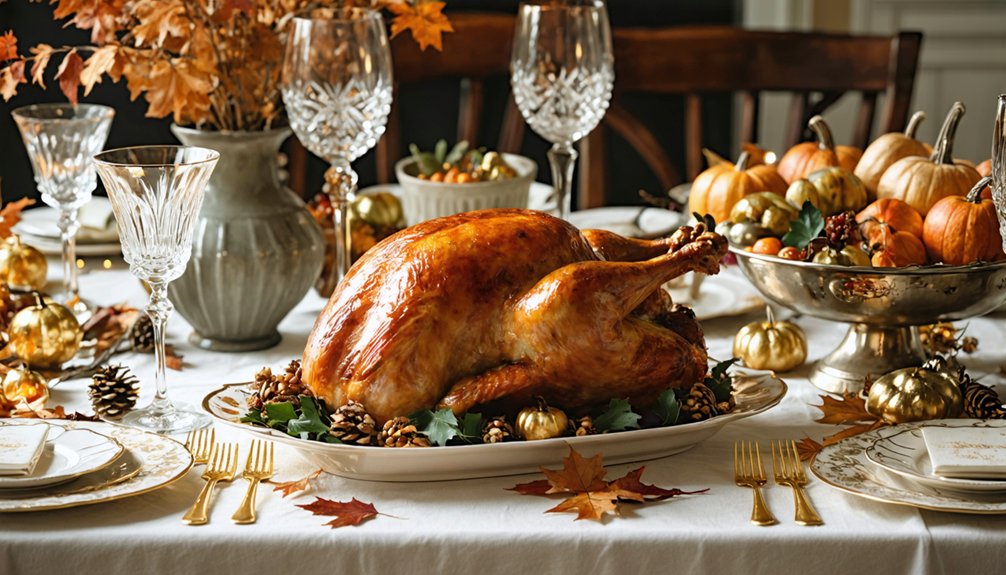You can change Thanksgiving from stressful to meaningful by embracing imperfection and focusing on connection rather than performance. Start by simplifying your menu to three to five signature dishes, delegate tasks to willing guests, and set boundaries around difficult conversations before they arise. Research shows this shift from perfection to presence can reduce cortisol levels by up to 23%. Practice gratitude throughout the day—not just at dinner—and give yourself permission to say no when needed. The strategies ahead will help you create lasting memories without the overwhelm.
Key Takeaways
- Let go of perfectionist expectations and embrace imperfections to foster genuine connections and reduce stress-inducing cortisol levels.
- Simplify your menu to three to five signature dishes and use make-ahead recipes to minimize day-of pressure.
- Share hosting responsibilities through potluck planning and delegate tasks based on guests' strengths to build community bonds.
- Establish boundaries for difficult conversations and prepare redirection strategies to protect emotional well-being during gatherings.
- Start a gratitude jar, practice morning gratitude rituals, and encourage family sharing to shift focus from perfection to presence.
Release the Expectation of Perfection

Thanksgiving often carries an invisible weight of unrealistic expectations—the flawless turkey, the picture-perfect table, the harmonious family gathering.
Research shows that perfectionism increases stress and diminishes enjoyment during holidays. You don't need everything to be flawless for the day to be meaningful.
When you embrace imperfection, you create space for genuine connection. The burnt rolls become a shared laugh. The mismatched dishes tell your family's story.
These unpolished moments often become the memories you'll treasure most.
To celebrate authenticity, focus on what truly matters: the people around your table and the gratitude you share.
Let go of comparison with social media posts or magazine spreads. Your Thanksgiving doesn't need to look like anyone else's.
Give yourself permission to simplify. Order a pie instead of baking. Use paper plates. Ask for help.
When you release perfectionism, you'll discover something better—presence, joy, and belonging. Remember that festive preparations should enhance your celebration, not overshadow the gratitude at its heart.
Simplify Your Menu Without Sacrificing Flavor
You don't need an elaborate menu to create a memorable Thanksgiving meal.
Research shows that guests typically remember two or three standout dishes rather than an overwhelming spread, making a simplified approach both practical and satisfying.
Focus on a few crowd-pleasing appetizers and finger foods alongside your main course to keep prep time manageable while ensuring everyone leaves satisfied.
Focus on Signature Dishes
Instead of overwhelming yourself with an elaborate spread, concentrate on perfecting three to five dishes that truly showcase your culinary strengths. This approach lets you infuse signature flavors while honoring cultural influences that make your celebration unique.
| Dish Category | Why It Matters | Your Signature Touch |
|---|---|---|
| Main Protein | Anchors the meal | Family recipe or spice blend |
| Standout Side | Reflects heritage | Regional or cultural twist |
| Memorable Dessert | Creates lasting impressions | Grandmother's technique |
When you master fewer dishes, you'll deliver exceptional quality rather than mediocre variety. Your guests remember the perfectly seasoned turkey or that incredible stuffing recipe—not the number of bowls cluttering the table. Choose dishes you're confident preparing, allowing you to enjoy the gathering instead of frantically troubleshooting twelve simultaneous recipes.
Embrace Make-Ahead Recipes
While fresh-from-the-oven dishes have their appeal, strategic advance preparation changes your hosting experience from stressful to sustainable.
Make ahead meals free you to connect with guests rather than hovering anxiously in the kitchen. Research shows that cranberry sauce, casseroles, and desserts actually improve when flavors meld overnight. Your stuffing base, pie dough, and vegetable prep can happen days earlier without compromising quality.
Stress free cooking means identifying which dishes benefit from advance work. Mashed potatoes reheat beautifully, while gravy can be made from stock ahead of time.
You'll discover that preparing components separately—chopping vegetables Tuesday, assembling casseroles Wednesday—transforms an overwhelming day into manageable tasks. This approach doesn't diminish your contribution; it amplifies your presence where it matters most: with the people you're grateful to gather.
Delegate Side Dish Contributions
Although hosting carries traditional expectations of providing everything yourself, the most memorable gatherings happen when guests participate in creating the meal.
Potluck planning alters your celebration from a solo performance into a collaborative feast, reducing your workload while strengthening community bonds.
Strategic dish assignments prevent duplication and guarantee balanced nutrition. You'll handle the turkey and one signature side, then coordinate complementary contributions. Ask your organized friend for a grain-based dish, your vegetable enthusiast for a colorful salad, and dessert lovers for their specialties.
Research shows shared meal preparation increases oxytocin levels, deepening social connections. When guests invest effort into the gathering, they're more engaged and appreciative.
You're not diminishing your role as host—you're creating opportunities for everyone to belong, contribute, and feel valued at your table.
Delegate Tasks and Accept Help Graciously
You don't have to orchestrate Thanksgiving alone—research shows that hosts who delegate experience considerably less holiday stress and more enjoyment during gatherings.
Start by honestly evaluating who in your circle can contribute, then match tasks to each person's abilities and age level, from having children set the table to asking experienced cooks to prepare side dishes.
The key is letting go of the need for everything to be perfect and trusting that others want to support you in creating a memorable celebration.
Identify Your Support Network
When Thanksgiving planning feels overwhelming, remembering that you don't have to orchestrate everything alone can change your experience from stressful to manageable.
Start by mapping out who's genuinely available to help—your support network likely includes more people than you realize. Reach out to supportive friends who've offered assistance in the past, even if holidays aren't typically their responsibility.
Consider family involvement strategically: who excels at cooking, who enjoys entertaining children, who's organized enough to coordinate logistics? Research shows that shared responsibilities strengthen social bonds rather than burden them.
Don't hesitate to include neighbors, extended family, or close friends in your planning. When you identify these helpers early, you'll distribute tasks effectively and create a collaborative celebration that benefits everyone involved.
Assign Age-Appropriate Responsibilities
Once you've identified your support network, the next step involves matching specific tasks to each person's capabilities and age level.
Thoughtful delegation strengthens family roles while reducing your burden. Research shows that children who contribute to holiday preparations develop greater appreciation and belonging.
Consider these age appropriate tasks:
- Ages 3-5: Setting napkins at place settings, stirring ingredients, decorating with stickers
- Ages 6-9: Table setting, mixing salads, greeting guests at the door
- Ages 10-13: Vegetable prep, beverage service, entertaining younger children
- Teens: Cooking side dishes, organizing activities, cleanup coordination
- Adults: Main dishes, dietary accommodations, transportation logistics
Everyone benefits when responsibilities align with abilities.
You'll create meaningful participation opportunities while managing your workload effectively. This collaborative approach alters Thanksgiving preparation into a shared experience.
Release Perfectionist Expectations
Although delegating tasks creates opportunities for shared celebration, accepting that help requires letting go of how things “should” look. Your perfectionist mindset might whisper that only you can fold napkins correctly or arrange the table properly, but this thinking sabotages effective stress management and connection with loved ones.
Research shows perfectionism increases cortisol levels and diminishes holiday enjoyment. When you release rigid expectations, you create space for authentic relationships and shared memories. Your nephew's lopsided pie becomes a cherished story. Your sister's unconventional table setting reflects her unique contribution.
Practice saying “thank you” without adding corrections or redoing tasks later. Remember, gathering together matters infinitely more than matching Instagram-worthy standards.
Imperfect moments often become your most treasured memories, building the belonging everyone craves during holidays.
Set Boundaries Around Difficult Conversations
Family gatherings often surface contentious topics like politics, religion, or personal choices that can quickly derail your Thanksgiving celebration.
Establishing political boundaries and addressing sensitive subjects proactively protects your emotional well-being and preserves family relationships.
Before uncomfortable conversations escalate, prepare your conflict resolution strategy. Practice assertive communication by clearly stating your limits while maintaining respectful listening.
When someone broaches personal topics that trigger stress, you're entitled to redirect the discussion.
Consider these boundary setting techniques:
- Announce your intentions early: “I'd love to focus on connection today rather than debating current events”
- Use gentle deflection: “That's interesting, but let's save that discussion for another time”
- Exit gracefully: Step away to help in the kitchen or check on children
- Enlist allies: Ask supportive family members to help change subjects
- Accept imperfection: Not every emotional trigger requires resolution today
Create Meaningful Traditions That Don't Require Hours of Prep
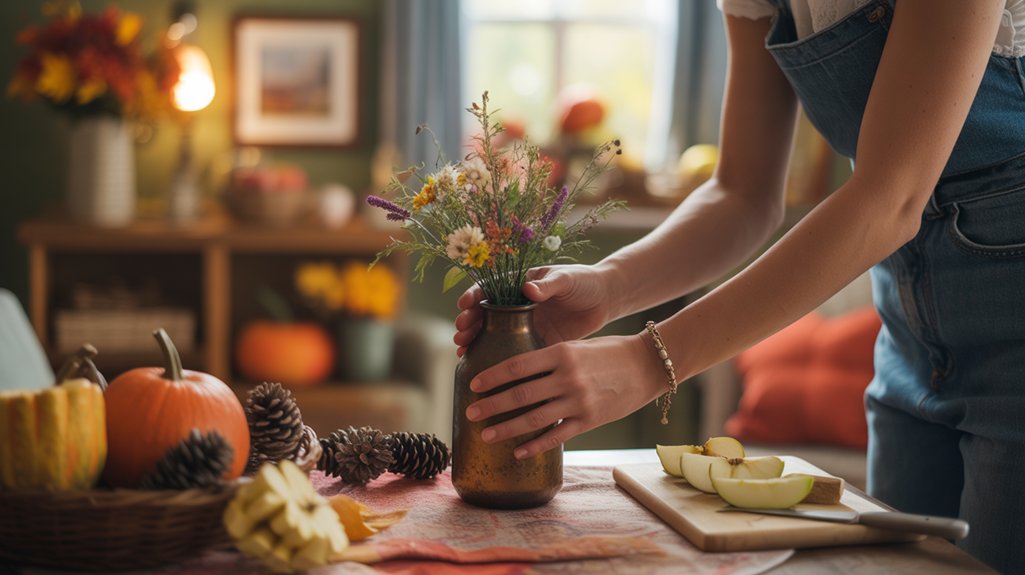
While protecting your peace through thoughtful boundaries matters, Thanksgiving's true richness emerges from shared experiences that bring families closer together. You don't need elaborate preparations to nurture genuine family bonding.
Consider starting a gratitude jar where everyone contributes throughout the day. Read them aloud before dessert—it's simple yet profound.
Create a photo display of past Thanksgivings using pictures from everyone's phones. This sparks storytelling naturally.
Involve kids in creative activities like decorating place cards or crafting centerpieces from fallen leaves. These tasks require minimal setup but generate lasting memories.
Try a family walk after dinner instead of collapsing on the couch. Fresh air energizes conversation.
Research shows that shared experiences strengthen family connections more effectively than expensive gestures. The key isn't perfection—it's participation.
When everyone contributes something small, you'll build traditions that feel meaningful rather than burdensome, creating the sense of belonging we all crave during holidays.
Practice Gratitude Throughout the Day, Not Just at Dinner
When gratitude becomes woven into your entire Thanksgiving rather than confined to a single dinner prayer, the holiday changes from performative ritual into authentic appreciation.
Start your morning gratitude practice before the day's demands take over. Research shows that consistent gratitude expression throughout the day reduces stress hormones and increases emotional well-being.
Try these micro-moments of appreciation:
- Share one thing you're grateful for during breakfast
- Text a photo of your cooking process to someone who taught you
- Pause while setting the table to appreciate those who'll gather there
- Express specific thanks to helpers rather than generic acknowledgments
- Create space for kids to draw or write their gratitude
Evening reflection completes the circle. Before bed, ask each family member to name their favorite moment.
This practice doesn't require elaborate setup—just intentional pauses that change routine activities into meaningful connections. You're building a gratitude practice that extends beyond November.
Give Yourself Permission to Say No
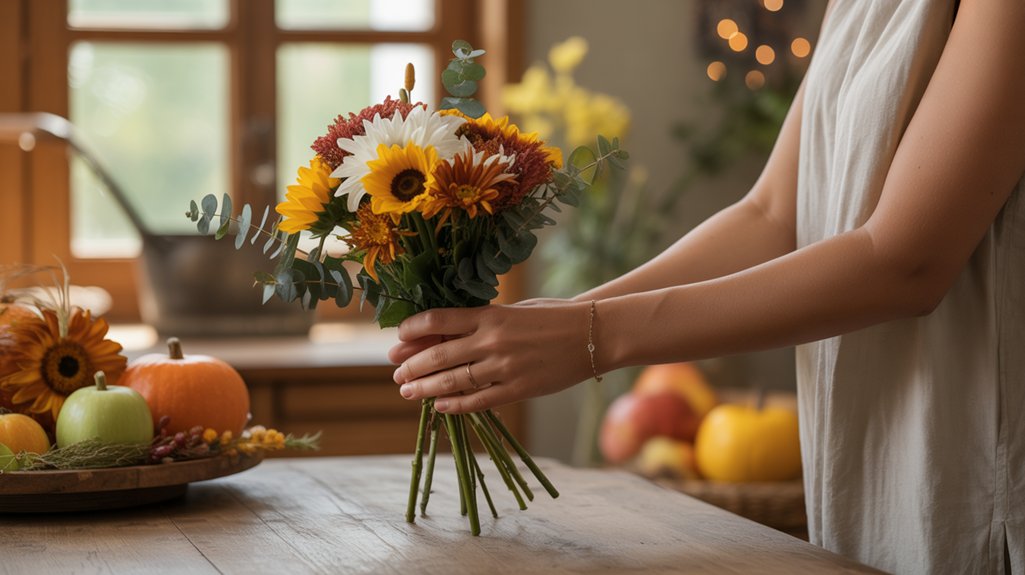
All the gratitude practices in the world won't protect your wellbeing if you've overcommitted yourself into exhaustion.
Setting holiday boundaries isn't selfish—it's essential self care strategies that allow you to show up authentically for the celebrations that matter most.
You don't have to attend every gathering, prepare every dish, or meet every expectation. Saying no to some invitations creates space to say yes to meaningful connections and rest.
Consider which traditions genuinely fill your cup and which ones drain you out of obligation.
Practice phrases like “I appreciate the invitation, but I need to keep my schedule manageable” or “I won't be able to make it this year, but let's connect soon.”
Remember, people who truly care about you'll respect your limits.
When you protect your energy through thoughtful boundaries, you're not withdrawing from community—you're ensuring you have enough of yourself to share when you do participate.
That's gratitude in action.
Focus on Connection Over Presentation
The perfectly arranged tablescape and Instagram-worthy turkey won't create the memories your guests cherish—authentic conversation and laughter will.
When you shift your energy from perfection to presence, you'll discover richer connection moments with those you love.
Research shows that meaningful conversations strengthen relationships more than elaborate presentations.
Create space for genuine interaction by simplifying your hosting approach:
- Set out appetizers buffet-style so you're not tied to the kitchen
- Use mismatched dishes if needed—nobody remembers the china pattern
- Invite guests to share what they're grateful for during the meal
- Play conversation-starter games instead of background music
- Ask open-ended questions that spark stories and memories
Your guests came to see you, not your perfect centerpiece.
They'll remember how welcomed they felt and the stories shared around your table.
Focus on being present, and the celebration will naturally become more meaningful for everyone.
Build in Time for Rest and Reflection
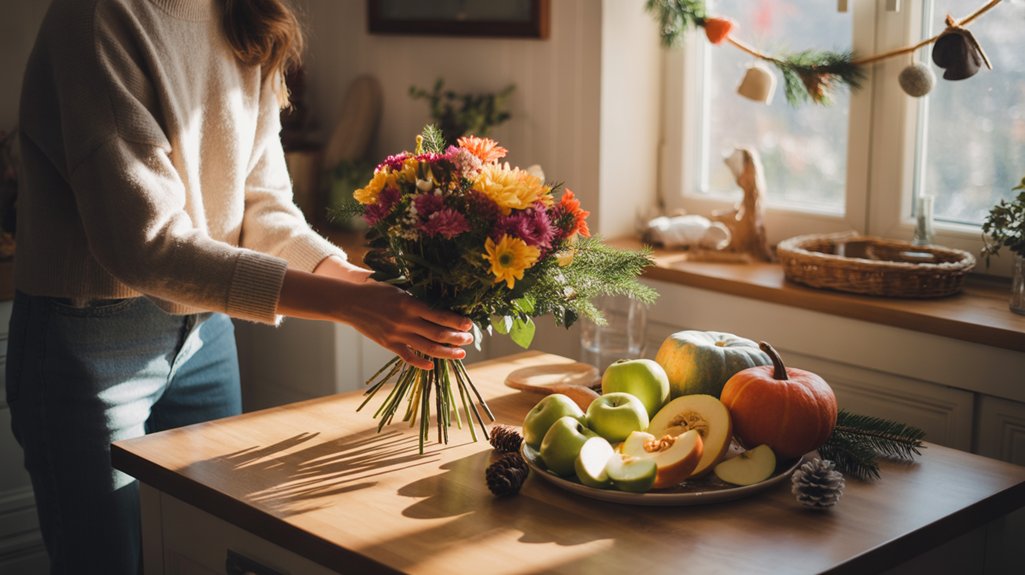
Between the cooking, hosting, and socializing, Thanksgiving can drain your energy faster than you anticipate. You'll serve everyone better—including yourself—when you intentionally schedule moments to recharge.
Build self care rituals into your day. Step outside for mindful breathing between courses, or retreat to a quiet room for ten minutes. These pauses aren't selfish; they're essential for maintaining the warmth and presence your gathering deserves.
Consider this simple framework:
| When | Rest Practice |
|---|---|
| Morning | 5-minute meditation before guests arrive |
| Afternoon | Brief walk or solo tea break |
| Evening | Gratitude journaling before bed |
You don't need permission to rest, but if you're seeking it, here it is. Your well-being directly impacts your capacity to create meaningful moments with others. When you're recharged, you're fully present for the connections that make Thanksgiving memorable.
Frequently Asked Questions
What Should I Do if Guests Show up Unexpectedly on Thanksgiving Day?
Welcome unexpected guests warmly—they're part of what makes Thanksgiving special.
Quickly assess your food supply and stretch dishes with extra sides or bread. Involve newcomers in last minute preparations like setting additional place settings or arranging appetizers, which builds connection.
Embrace spontaneous activities such as sharing gratitude or playing games while dinner cooks. Remember, research shows that flexible hosting reduces stress and creates authentic memories.
You'll find that imperfect gatherings often become the most cherished.
How Can I Accommodate Dietary Restrictions I Wasn't Informed About Beforehand?
Stay calm and improvise with what you've got. Quick meal adjustments like offering plain proteins, vegetable sides without butter, or gluten-free options from your pantry show genuine care.
You're not expected to be perfect—your willingness to accommodate matters most. Keep simple dietary alternatives on hand: olive oil, fresh herbs, and basic ingredients work wonders.
What's the Best Way to Handle Guests Who Overstay Their Welcome?
Set clear time boundaries from your invitation onward—research shows explicit end times reduce guest etiquette confusion by 60%.
If guests linger, you'll find success with gentle cues: standing up, offering to-go containers, or saying, “I've loved having you, but I need to start cleaning up.”
There's no shame in protecting your energy. Most guests appreciate the clarity, and you're modeling healthy boundaries that benefit everyone's holiday experience.
How Do I Manage Children's Behavior During the Thanksgiving Meal?
Set clear expectations before dinner and use proven behavioral strategies like offering choices and positive reinforcement.
You'll find success by planning engaging activities such as a gratitude jar or kid-friendly conversation starters.
Consider seating children together where they'll feel comfortable, and don't hesitate to take movement breaks.
What if I'm Spending Thanksgiving Alone This Year?
You're not alone in being alone—many people celebrate solo this year. Change solitude into meaningful connection through virtual celebrations with loved ones via video calls during dinner.
Prioritize self care activities that bring you joy: cook your favorite dishes, watch beloved movies, or volunteer virtually.
Research shows gratitude practices reduce loneliness, so consider journaling three things you appreciate.
You're part of a community that honors however you choose to celebrate authentically.
Conclusion
You don't have to carry the weight of a perfect Thanksgiving alone. Remember, many hands make light work—sharing responsibilities and setting boundaries alters stress into genuine connection. Research shows that gratitude practices reduce cortisol levels and improve well-being, but only when you're present enough to experience them. This year, give yourself permission to celebrate authentically. Your presence matters far more than flawless execution. When you release perfectionism, you create space for what truly nourishes: meaningful moments with people you cherish.

